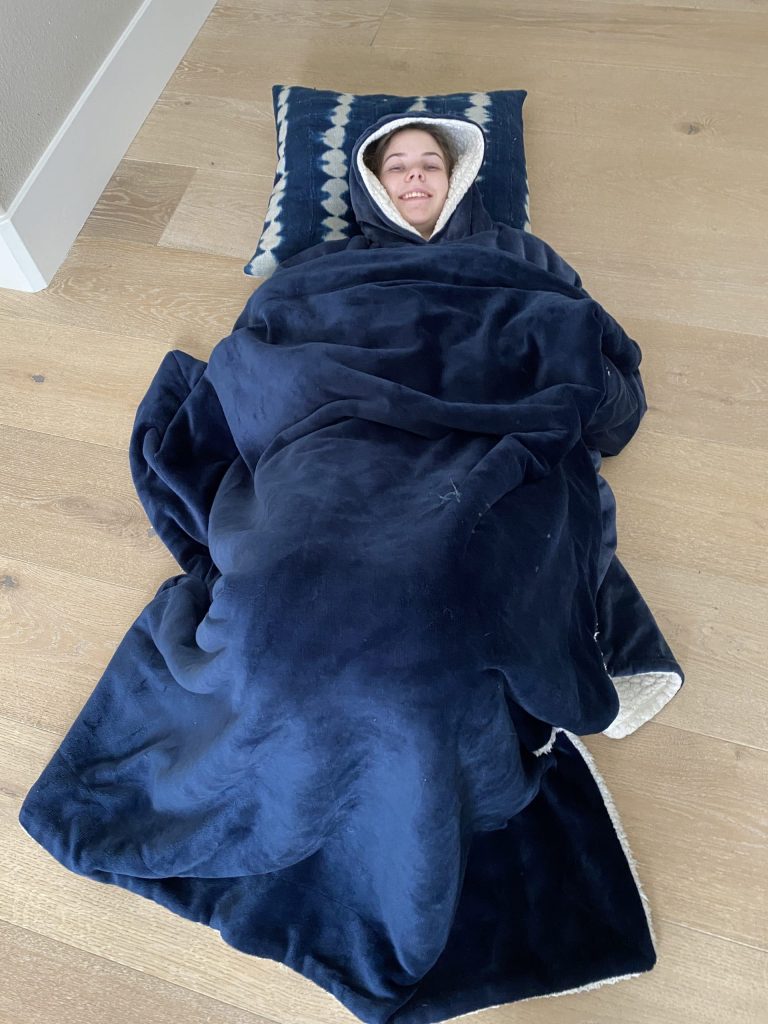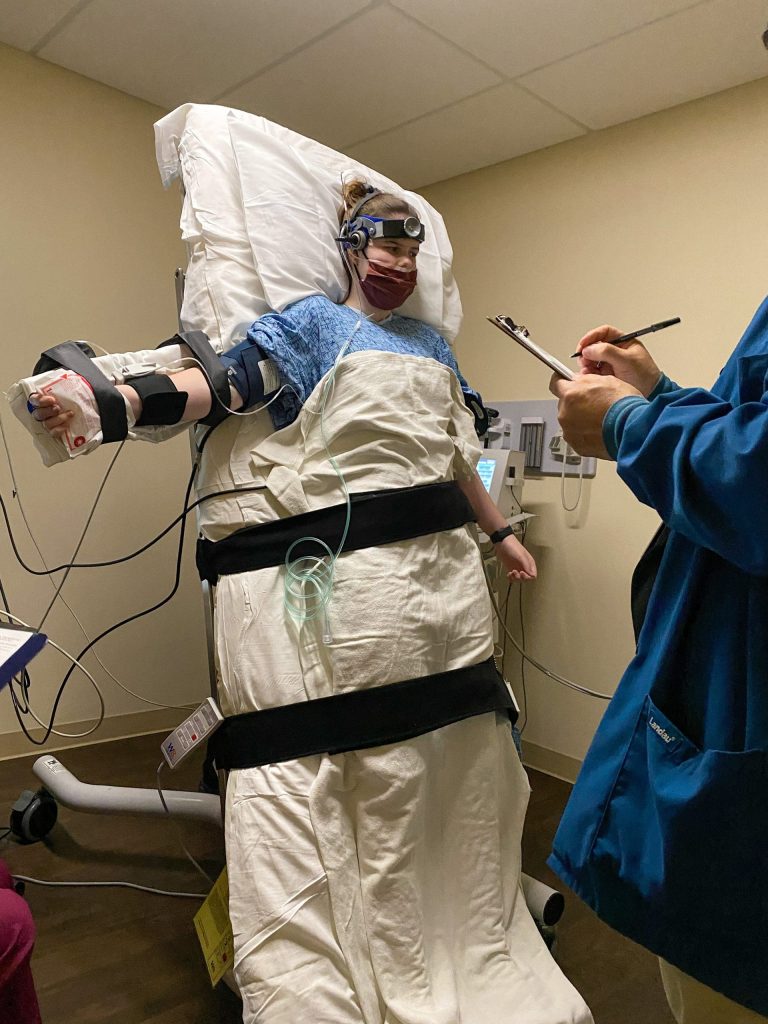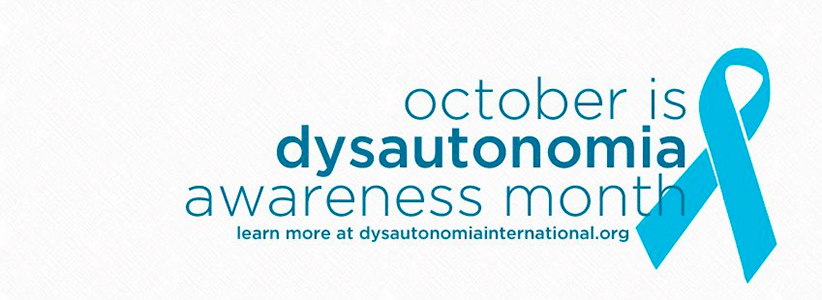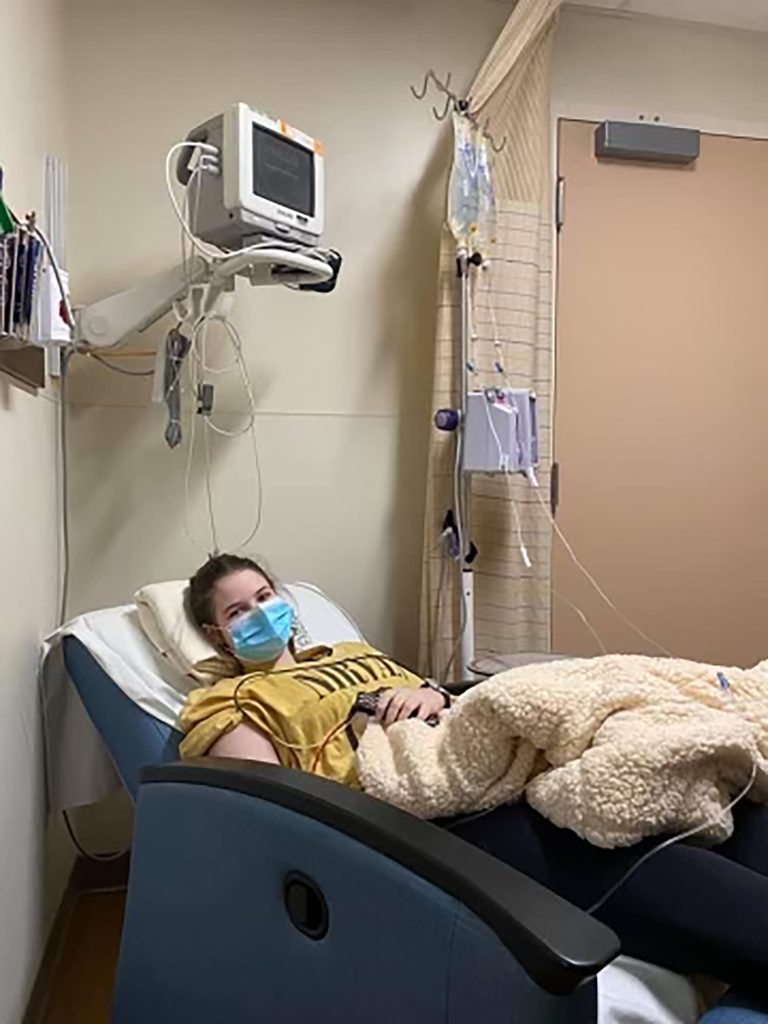This is my daughter…..

And so is this…….

Postural Orthostatic Tachycardia Syndrome (POTS) changed our lives…
I am sure you are all saying, “what in the world is POTS?” I have never heard of it. POTS is a form of Dysautonomia that primarily affects the Autonomic Nervous System. The ANS controls all our unconscious bodily functions like breathing, heart rate, blood pressure, and temperature regulation. A person with POTS has orthostatic intolerances, including high or low blood pressure, high heart rate, and blood volume or pooling. It causes fainting, dizziness, fatigue, brain fog, headaches, and digestion issues.
Dysautonomia is not a specific diagnosis but an umbrella term for any malfunction of the Autonomic Nervous System. There are many possible underlying causes, but often a root cause cannot be found. Because symptoms vary, Dysautonomia patients can go for years undiagnosed, belittled, or dismissed.
Cami’s Story∗

Cameron was always a busy kid. She climbed out of her crib at nine months, walked at 11 months, and spoke complete sentences by her first birthday. After that, Cami never really slowed down. By 17, she was an accomplished martial artist with a 3rd-degree black belt in Taekwondo with World, National, and Pan Am Titles on her resume. She was a successful student who had just completed her university applications and was looking forward to heading to the East Coast for college.
But then Covid changed everything. Quarantine pushed the school online and caused her to pause most of her training. In December, our entire family got Covid. Thankfully, we all had a mild case; in fact, my husband was asymptomatic for the first ten days. Cami was the most affected. She lost taste & smell, had difficulty breathing, but her most serious symptom was fainting.
She fainted several times on Dec. 3, 2020, and we decided a trip to the ER was in order. By Christmas, she was feeling more herself, but on Dec 29, 2020, we were back at the ER because she fainted ten times in one day. She was given every test imaginable at Rady’s Children’s Hospital, and all her results came back normal. We were referred to a Pediatric Cardiologist, and just days before her 18th birthday, she was tentatively diagnosed with POTS.
A Tilt Table Test confirmed her POTS diagnosis in April, and the doctor prescribed Midodrine, a blood pressure medication. Cameron has severe POTS. Her blood pressure is very low, and her heart rate gets very high, often over 200 bpm while standing. She is lucky she does not have a comorbidity such as EDS, Gastroparesis, or MCAS. Before medication, she would faint five or more times a day. On medication, she faints 5-7 times a week. But she is still fainting. Her heart rate is high but rarely goes above 160, and her blood pressure remains normal. She still visits the ER for IV fluids at least once a month.

Covid is But One Trigger
But, this is not a story about Covid. Covid was just her trigger. Other triggers include severe illness, Mono, concussion, car accident, or even surgery. POTS is more common among deconditioned athletes, and the majority of those diagnosed are women between the ages of 15 and 50.
Covid has raised awareness of POTS. It is considered one of several Long Haul Covid conditions, and recent studies show that 27% to 33% of mild Covid cases result in long haul symptoms.¹ With more people diagnosed (and men), the awareness surrounding POTS has grown.
Life Has Changed
On her cardiologist’s recommendation, Cami decided to take a gap year from college to work on her health. This has been a big adjustment for us all. Just as she was supposed to be more independent moving away to college, she became more dependant. Most days, she does not walk the stairs in our home alone. She is especially prone to fainting at the top of the stairs.

She cannot stand for long periods, so we prepare most of her meals. Brain fog makes it harder for her to remember her every four-hour medicine, so we regulate it for her. She cannot drive due to the risk of fainting, so we drive her where she needs to go. She has switched to a Gluten-Free diet due to severe stomach issues, which has helped tremendously, but she still vomits regularly.
On the flip side, she turned 18 just as she was diagnosed, and she is expected to enter doctor’s offices alone, manage her doctor’s appointments and medications independently. She even was forced to stay in the ER alone as an adult because of Covid protocols until she started to have a panic attack, and I went all momma bear on the nurse. The reality that the world considers you an adult while you have become more reliant on others is a strange dichotomy.
Silver Linings

Yes. This last year has been a rough time for Cami and our entire family, but there is always a silver lining. Pushing the pause button on her life has allowed Cami to prioritize her goals. She still plans to major in journalism but has set her sights on one of the best journalism programs in the country.
She definitely keeps herself busy. Cami has taken up baking (when she feels ok), crochet for when she can’t leave the bed, and built quite a following on TikTok, making current events videos that fall nicely in line with her journalism goals. If you want to follow her on TikTok, check out @cami.twomeyy
We have enjoyed more time as a family. This year is a bonus, and we don’t take it for granted. Our busy girl will be out in the world soon enough. We have all had to shed our preconceived ideas about what she should be doing right now, freeing us to focus on gratitude in the here and now.
The Future is Unknown
POTS is not curable. Cami will deal with POTS for the rest of her life. The goal is to decrease her symptoms to a point where she can function alone in the world. Because we are not sure how long that will take, she has decided to apply for a service dog to help her when she does go off to college. We are hopeful a service dog can alert her before she faints and protect her if she should faint in public.
Since this is new for us and we don’t know how much her symptoms will improve. We do know other medications and therapies may help. Our goal is to find one that helps dramatically. She currently does PT five times a week, drinks lots of water, takes salt tablets, and wears compression garments when feeling severe. We are fortunate to be under the care of a Cardiologist familiar with POTS. The progress is slow, but we keep trudging forward. We are all adapting to the new normal.
Dysautonomia Awareness

October is Dysautonomia Awareness Month. It brings awareness to disorders that affect the Autonomic Nervous System. The hope is through awareness there will be improved support, diagnosis, and research. The Cleveland Clinic estimates Dysautonomia impacts more than 70 million people. There are approximately 15 different types of Dysautonomia, with POTS being one of the most common.
Despite the prevalence of POTS, the average diagnosis delay is almost six years. Furthermore, less than 25% are diagnosed within the first 12 months of symptoms.² Cameron was lucky to be diagnosed so quickly likely due to the severity of her symptoms, the increased awareness because of Covid, and finding the right doctor quickly. Unfortunately, many are not so fortunate and suffer symptoms for years often dismissed or misdiagnosed by doctors.
Research is critical because currently, there is no cure, and so many suffer from life-altering symptoms. Treatment is complex because each POTS patient is different, with a unique set of symptoms. Support from other families dealing with Dysautonomia has been critical for us. There are many support groups for POTS patients and family members. You can find a good list at Dysautonomia International online.
Cami’s story is very personal to us, but she is but one of a thousand stories of POTS around the world. Cami is determined that POTS will only be a chapter in her autobiography, not the whole book.
We have found these items to be helpful in her POTS journey:
- SaltStick Vitassium Tablets – Salt increases blood volume and blood pressure.
- Aquafit 1 Galloon Water Bottle – Track your water intake. Try and drink it all.
- Liquid IV Lemon Lime – Electrolyte drink to help with maintaining sodium levels.
- 2XU Compression Leggings (high end)or Old Navy Compression Leggings (affordable) – Helps prevent blood from pooling in the legs. My daughter likes to Old Navy for everyday best, but when suffering or traveling, she wears the 2XU.
- Compression Socks Black or Cool Patterned Compression Socks – Cami will only wear the black.
- Medline Shower Chair – Many injuries happen in the shower. Therefore, it is best to use a shower chair for safety.
- Electric Throw Blanket – POTsies have a difficult time regulating their temperature. An electric blanket keeps them warm when needed.
- Disposable Barf Bags – Yep. POTsies get car sick often. Good to have around, just in case.
I would love it if you followed me on Instagram for my everyday outfits or on Pinterest for my fashion inspiration. StyleDahlia is a fashion and lifestyle website with a modern take on midlife. We hope to inspire you to step out of your comfort zone, try new things, and live your life in full bloom.
Disclaimer: This post may contain affiliate links. If you make a purchase from one of them, I will receive a small commission at no extra cost to you, which allows me to keep this blog up and running. If you would like to know more, visit my disclosure policy page.
∗Told with her permission.
¹ UCDavis Health Study published March 30, 2021
² Source Dysautonomia International





